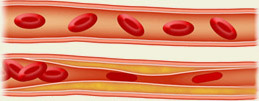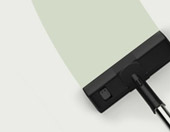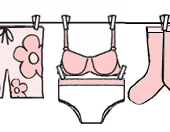
As atherosclerosis grows, less blood can flow through the arteries -- a condition called Coronary Artery Disease (CAD). As a result, the heart muscle can't get the blood or oxygen it needs, leading to chest pain (angina) or a heart attack.
Most heart attacks happen when a blood clot suddenly cuts off the hearts' blood supply, causing permanent heart damage. Over time, CAD can also weaken the heart muscle and contribute to heart failure and arrhythmias.
CAD is the leading cause of death in the United States in both men and women.
Information: http://www.nlm.nih.gov/
medlineplus/coronaryarterydisease.html
Graphic: By Icewalker cs (Own work) [GFDL (www.gnu.org/copyleft/fdl.html) or CC-BY-3.0 (www.creativecommons.org/licenses/by/3.0)], via Wikimedia Commons
Preventing heart disease, part 2: Why cholesterol is a concern for heart health.
Posted in Health & Wellness on April 12, 2014 by FloridaHealth.com staff. Last modified on December 02, 2018. Read disclaimer.
Cholesterol; it's a waxy, fat-like substance produced by the body and present in animal-based foods that's essential for the production of healthy cells, certain hormones and Vitamin D.
The problem is, one out of six Americans has too much cholesterol in our blood. And when this happens, there is a greater chance of cholesterol and other materials (plaque) building up in our arteries, making it difficult for blood to flow and increasing our risks of heart attack and stroke.
While all blood vessels of cholesterol build-up (which can result in a narrowing and hardening of the arteries which doctors refer to as atherosclerosis), the vessel walls of the aorta and coronary arteries that serve the heart are most often affected. The arterial walls eventually become hard, cutting off oxygen and blood supply to the heart itself.
Do you know your cholesterol level?
The National Cholesterol Education Program recommends that all of us over the age of 20 have our cholesterol tested every 5 years. Statistically, that means, 1 in 4 of us is probably overdue -- but worse, 1 in 5 of us has NEVER had our cholesterol levels checked. And when you look at American ethnic groups -- nearly 1/2 of Hispanic adults (48%) have never had a cholesterol test!
+ Free Shipping & Returns on Eligible Items.
(*Amazon's Top 100 list updated hourly.)
Is high cholesterol a concern only for adults?
No. The buildup of plaque in arteries begins in childhood and progresses over a lifetime. For this reason, it is important that ALL youngsters learn to eat a heart healthy diet. In addition, children whose parents have high cholesterol or whose parents or grandparents were diagnosed with heart disease at age 55 or younger are especially at risk and should be tested.
How would I know if I have high cholesterol?
There are no outward signs that you may have high cholesterol -- even skinny people can can be effected. (In fact, skinny people are often less careful about what they eat, consuming excessive saturated fats, trans fats, and dietary cholesterol -- all of which can increase cholesterol levels.) The only way to know if you suffer from high cholesterol is to have a simple blood test administered by your doctor. You will be instructed to abstain from eating or drinking anything for 9-12 hours prior to the test.
What will a cholesterol test tell me?
A cholesterol test (fasting lipoprotein profile) considers total cholesterol as well as:
HDL: The "good" cholesterol, which keeps cholesterol from building up in our arteries and protect us from heart disease. A low HDL number can increase your risk of heart disease while a high number is considered to be protective.
LDL: The "bad" cholesterol which, in excess, can clog arteries and increase our risk of stroke and heart disease. A higher number can increase your risk of heart attack or stroke but other risk factors should also be considered. The same number may be interpreted as healthy for one person but not healthy for another.
Triglycerides, the most common type of fat in the body. A normal triglyceride level varies according to age and sex but generally, a higher triglyceride level combined with low "good" cholesterol or high "bad" cholesterol can lead to the buildup of plaque on artery walls, called atherosclerosis.
Where does cholesterol come from and why do we even need it?
75% of the cholesterol in our body is produced by our liver while 25% of our cholesterol comes from the foods we eat. Cholesterol is necessary for a number of body functions including formation of cell membranes, production of hormones, Vitamin D, bile acids and more.
High cholesterol risk factors include:
- diabetes
- family history of high cholesterol
- being overweight or obese
- smoking
- physically inactivity
- drinking alcohol in excess of 1 drink per day for women or 2 drinks per day for men
- consuming excessive amounts of simple carbohydrates/sugars
- consuming foods high in saturated fats, trans fats (most commonly found in snack foods, fast foods, shortening and margarine products) and cholesterol.
- certain medications such as progesterone, high blood pressure drugs, birth control pills, anabolic steroids and testosterone, female hormones and some acne medications.
- underlying diseases such as diabetes or metabolic syndrome
- as we age, our cholesterol and triglyceride levels normally increase
Factor that can influence our cholesterol for the better include:
- watch our weight. More than 2/3 of American adults are overweight including the 1/3 who are considered to be obese. To see if you are at a healthy weight, visit the CDC's BMI Percentile Calculator for Child and Teen or Adult BMI Calculator
- don't smoke and avoid exposure to secondhand smoke
- increase your physical activity: adults need least 30 minutes/5 days per week of some sort of physical activity -- even if it is something as simple as taking the steps rather than the elevator or parking farther away in a parking lot when you go to work or shopping. Children need 60 minutes every day.
- minimize consumption of saturated fats, trans fats, dietary cholesterol, sodium and sugar (sodas, candy and sweet desserts)
- eat a heart-healthy diet consisting of:
6+ servings/day of whole grain products such as breads, cereals, pasta, cooked grains (fiber to helps control cholesterol)
5-6 oz/day of lean protein,
8 to 10 servings/day of a variety of fruits and vegetables
2-3 servings/day of low or fat-free dairy products.
Omega-3 rich fish (such as salmon, trout or herring) at least twice a week
include more beans, peas, nuts and seeds
use unsaturated vegetable oils (such as canola, olive or safflower) - limit alcohol intake
- medication may be prescribed if lifestyle changes are not enough to lower your cholesterol
To learn more about lowering cholesterol for better heart health, visit: http://www.heart.org/HEARTORG/Conditions/Cholesterol/Cholesterol_UCM_001089_SubHomePage.jsp
http://www.heart.org/idc/groups/heart-public/@wcm/@hcm/documents/downloadable/ucm_300460.pdf
http://mylifecheck.heart.org/
https://www.myhealth.va.gov (va_health_library/high_blood_cholesterol.htm)

 Germiest items in your home | Quiz
Germiest items in your home | Quiz When to wash clothes | Infographic
When to wash clothes | Infographic How to select, ripen and enjoy healthy avocados
How to select, ripen and enjoy healthy avocados Potty training tips for girls and boys
Potty training tips for girls and boys Home & yard mosquito control | Infographic
Home & yard mosquito control | Infographic 9 Beauty secrets to younger-looking skin
9 Beauty secrets to younger-looking skin Dietary needs of adults and older adults
Dietary needs of adults and older adults Can cranberry juice prevent urinary tract infections?
Can cranberry juice prevent urinary tract infections? 9 Foods that are delicious and super nutritious
9 Foods that are delicious and super nutritious What works (and what doesn't) for hangovers
What works (and what doesn't) for hangovers Tips for preventing or treating sunburns
Tips for preventing or treating sunburns Foods that are high in calcium for healthy bones
Foods that are high in calcium for healthy bones Action plan for getting rid of cockroaches
Action plan for getting rid of cockroaches What causes body odor and how to prevent it
What causes body odor and how to prevent it Important tips for preventing heart disease
Important tips for preventing heart disease Ha! Try this funny technique for managing stress
Ha! Try this funny technique for managing stress How to prevent and remove mold and mildew
How to prevent and remove mold and mildew Container gardening ideas
Container gardening ideas What is cholesterol and tips for managing it
What is cholesterol and tips for managing it